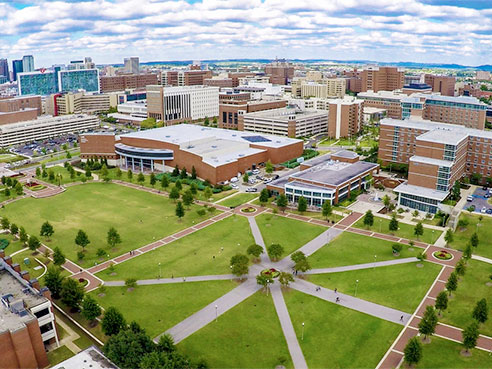Written by: Tiffany Westry
Need more info? Contact us
 UAB is now home to the largest solar-energy system in the city of Birmingham. The 100-panel system, installed by Birmingham’s Vulcan Solar Power in October 2016, sits atop the UAB Campus Recreation Center.Efforts to reduce environmental impact and costs, improve health and wellness, and provide environmental education to students and the Birmingham community have earned the University of Alabama at Birmingham the honor of being named a 2017 Green Ribbon School by the U.S. Department of Education.
UAB is now home to the largest solar-energy system in the city of Birmingham. The 100-panel system, installed by Birmingham’s Vulcan Solar Power in October 2016, sits atop the UAB Campus Recreation Center.Efforts to reduce environmental impact and costs, improve health and wellness, and provide environmental education to students and the Birmingham community have earned the University of Alabama at Birmingham the honor of being named a 2017 Green Ribbon School by the U.S. Department of Education.
UAB is one of three honored at the national and state level for its approach to creating “green” environments. The U.S. Department of Education Green Ribbon Schools Program is a federal recognition program that began in 2011. The program is designed to inspire schools, districts and institutions of higher education to strive for 21st century excellence, by highlighting promising practices and resources that others can employ.
“As UAB is a leading academic research institution, health care facility and the largest single employer in the state, effective and sustainable operations are essential to UAB’s mission,” said UAB President Ray L. Watts. “Our campus has become a living lab for developing novel pathways to sustainability.”
UAB was recognized for its efforts earlier this month by the Alabama State Board of Education and the Alabama Commission on Higher Education. In U.S. Department of Education's report highlighting the honorees, UAB is noted as, "having significant influence in safeguarding the environment, raising awareness and modeling green practices."
Reducing impact and cost
UAB has made a commitment to reduce greenhouse gas emissions by 25 percent within the next decade, and in 2014 the university established a committee to plan for and institute a comprehensive energy conservation plan. UAB is now home to the largest solar-energy system in the city of Birmingham. The 100-panel system, installed by Birmingham’s Vulcan Solar Power in October 2016, sits atop the UAB Campus Recreation Center. The university has also adopted the practice of Low Impact Development in its new construction projects. LID employs principles such as preserving and recreating natural landscape features, minimizing effective imperviousness to create functional and appealing site drainage that treats storm water as a resource rather than a waste product.
UAB Campus Dining and Restaurants have recently signed on to the LeanPath system. LeanPath is an automated food waste tracking system that allows UAB to track and measure its food waste. The LeanPath program offers a unique opportunity for raising awareness about manageable steps that can be taken toward a more sustainable food system. UAB Campus Dining and Restaurants also work with Ventura Foods and Standard Biofuels to recycle frying oils. The oil is converted to biofuel or blended with petroleum diesel to create biodiesel fuel. One hundred percent of all collected oil is recycled — reducing pollutants into the environment and UAB’s carbon footprint. Campus Restaurants recycles approximately 16,000 pounds of cooking oil each year.
Improving health and wellness
UAB Parking and Transportation offers several programs to reduce vehicle traffic on campus, which improves air quality, encourages more physical activity and reduces noise pollution on campus. Students and employees are encouraged to apply for special carpool tags and participate in CommuteSmart, a commuter program provided by the Regional Planning Commission of Greater Birmingham that offers free online ride matching, carpool and vanpool services, and an Emergency Ride Home program.
Environmental education
UAB students can apply for funding to pursue projects related to sustainability on campus. The UAB Sustainability Investment Fund, a joint project of UAB Sustainability and the UAB Division of Student Affairs, allows students to apply for funding to promote the initiation of projects related to sustainability on campus. The goal of the program is to provide grants for endeavors that improve UAB’s sustainability and efficiency, and decrease the university’s overall ecological footprint.
One of those student ideas, UAB’s Move Out, Don’t Throw Out Campaign, encourages students to donate or recycle their unwanted residence hall room furnishings and other items. The project is in its second year and has become very successful, with Facilities Management employees’ assisting students and student volunteers with donating food, furnishings, cleaning supplies, household goods, electronics and other items to local Salvation Army clients. Last year’s campaign provided 5,000 pounds of small furnishings, bedding, non-perishable food and small appliances for 25 of The Salvation Army’s transitional housing units, and Salvation Army shelters.
Other sustainability efforts on UAB’s campus include the addition of three electric car-charging stations now available to the UAB and Birmingham community, an on-campus steam plant, and a recycling center open to UAB students, faculty, staff and the general public. To learn more about sustainability initiatives at UAB, visit www.uab.edu/sustainability.
Click here to read more of the U.S. Department of Education's 2017 Green Ribbon Schools report.